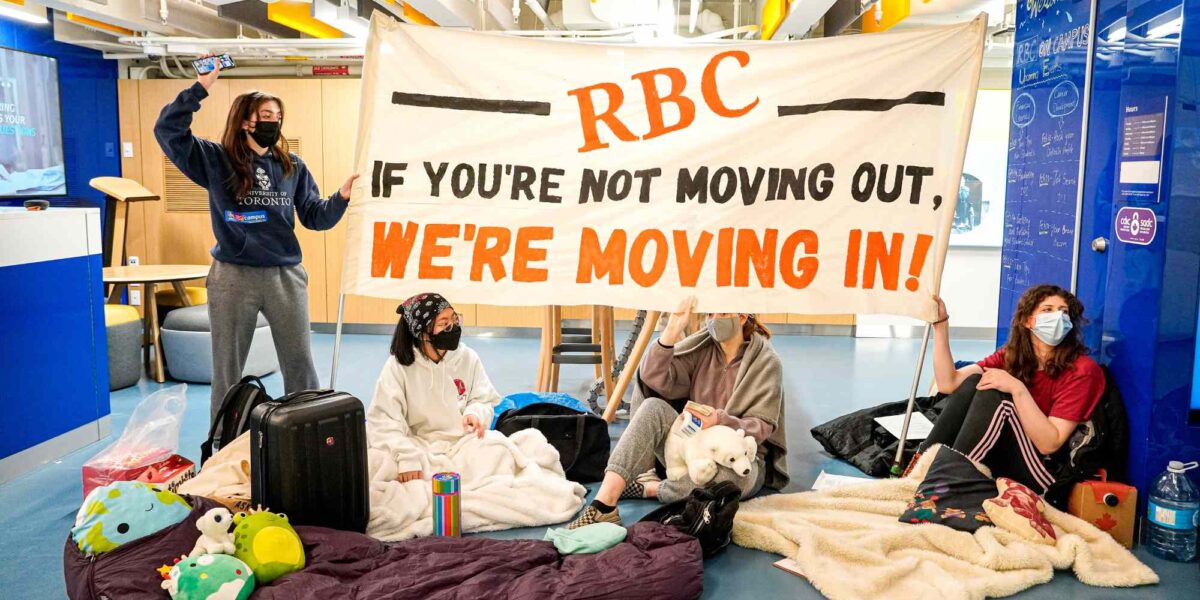Nine student unions from across the country are joining forces to call on banks to divest themselves of fossil fuel investments and to respect Indigenous land sovereignty.
Dubbed Change Course, the group of student unions include the University of Victoria Students’ Society, the Canadian Federation of Students-Ontario, the Concordia Arts and Science Federation of Associations, the Canadian Federation of Students Nova Scotia, the University of Ottawa Students’ Union, the York Federation of Students, the Trent Central Student Association, the Simon Fraser Student Society and the University of Toronto Students’ Union. Together these unions represent over 450,000 students.
“This summer alone, I think, students across the country saw the effects of the climate crisis firsthand,” said Dani Michie, digital organizer for Change Course in an interview with rabble.ca. “Living in Toronto, this is the first summer that I really feel like I experienced it, in terms of wildfire smoke and days where I couldn’t go outside.”
READ MORE: Wildfires result in smoke and mirrors from politicians, not action
In addition to the calls for divestment, the York Federation of Students, the University of Toronto Student Union and the University of Ottawa Student unions have all passed motions banning sponsorship from Canada’s largest private sector bank, the Royal Bank of Canada (RBC) and have banned RBC outreach centres, known as RBC OnCampus from their campuses.
Banks beginning to respond
“I think they’re quite scared of us,” said Michie, explaining that RBC reached out to their student union after students held a national day of action on the climate crisis last year.
“I know that the meeting that happened with the University of Toronto was quite frustrating,” explained Michie. “I think that it didn’t seem that there was much that RBC was offering them. But I think the fact that that meeting was even initiated affirms for students that like the tactics that we’re using are working.”
Earlier this year, RBC created a job post on their website looking for a new Head of Climate Transition, whose duties would include to “anticipate and manage RBC’s reputation related to climate transition activities and proactively mitigate any risk in this area,” according to the job post on the RBC website.
Climate crisis a central concern for students
In an email to rabble.ca Maisy Elspeth, advocacy commissioner for the University of Ottawa Students’ Union, explained why it was important for student unions to be at the forefront of the fight against the climate crisis.
“As a student representative organization, the climate crisis is a central concern. We need to ensure we have a livable planet post-graduation. Students have always been at the forefront of social movements, and it’s important that we carry on that legacy as we fight for climate justice,” Elspeth wrote. She added that the decision to push banks off campus was overwhelmingly supported by their members.
Supporting Indigenous sovereignty is another important issue for student unions, explained Ashley D’Souza, president of the York Federation of Students (YFS).
“The YFS has a long history of supporting Indigenous sovereignty, not just on Turtle Island but all across the world. The mining and building of pipelines is a direct attack on Indigenous communities and is an ongoing example of the rampant anti-Indigenous racism that still exists here in so-called Canada. For us, divesting from BMO was a crucial step in actualizing our commitment to solidarity with Indigenous communities,” D’Souza said.
Canadian private sector banks like RBC and Bank of Montreal (BMO) are primary backers of the Coastal Gaslink and Trans Mountain pipelines, which cross through Indigenous territory without the consent of those Indigenous peoples.
Editor’s Note 2023-11-06: A previous version of this article misnamed Maisy Elspeth as Mary. The mistake has been corrected and rabble regrets the error.



